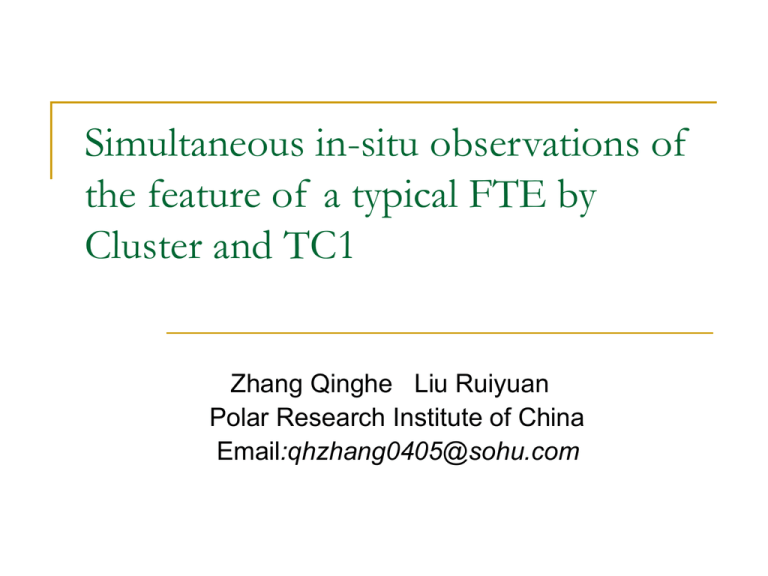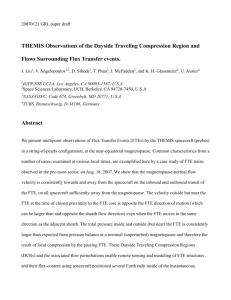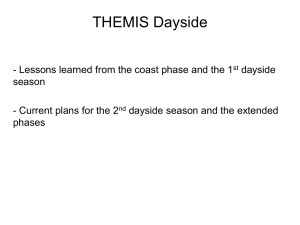Simultaneous_in
advertisement

Simultaneous in-situ observations of the feature of a typical FTE by Cluster and TC1 Zhang Qinghe Liu Ruiyuan Polar Research Institute of China Email:qhzhang0405@sohu.com Outline Introduction IMF and SW from ACE The orbit of Cluster and TC1 in GSM a) XZ-plane b) XY-plane Magnetic field feature of the FTE in LMN (MAV) a) Cluster FGM data b) TC1 FGM data Particles feature of the FTE Introduction Magnetic reconnection is the predominant mechanism by which solar wind energy and momentum are transmitted into the earth magnetospheric cavity. The first in-situ observations of transient reconnection in the vicinity of the high-latitude dayside magnetopause were reported by Haerendel et al.(1978) using HEOS-2 and Russell and Elphic(1978,1979) using ISSE-1 and -2. Termed “flux erosion events” by Haerendel et al. and “flux transfer events” (FTEs) by Russell and Elphic. Introduction Cluster's multi-point measurement capability has revealed new insights into the scale and location of the reconnection region, but the following questions are still not clear. --What is the evolution of a flux tube (FTE), from its generation at the magnetopause to its disappearance in the global magnetospheric convection? --With the tetrahedron configuration of Cluster, is it possible to measure the electrodynamics of an FTE, especially the distribution of the field-aligned currents (with the Cluster curlometer) and the ionospheric closure of the currents (with Ground-based observations)? .... Recently, many authors presented their researches about FTEs coordinated satellites and ground-based observations, such as Wild et al. (2001,2003,2005a,b), Lockwood et al. (2001a,b),and so on. Introduction Characters of FTEs: a) bipolar signatures in the field component normal to the magnetopause (Bn) positive-negative in the northern hemisphere and negative-positive in the southern hemisphere . b) increases in total |B| Location: vicinity of the magnetopause Scale: ~Re Lasted: few minutes IFM and SW from ACE ---from CDAWEB Have detracted the delay : ~64.5 mins The orbit of Cluster and TC1 in GSM Using Tsyganenko-96 model Input the real-time parameters: Pram: 1.61 Pa Dst: -6 nT IMF By: -1.81nT IMF Bz: -9.66nT FGM feature of the FTE in LMN (MAV) For Cluster: a) In the exterior cusp b) The outward magnetopause normal determined by minimum variance analysis (MVA) of Cluster 1 data during the interval of 11:10-11:20UT. N= (0.59,0.25,0.77); Typical bipolar structure in the Bn component positivenegative with |B| increased, the time at the core: 11:33:25 FGM feature of the FTE in LMN (MAV) Using Cluster multi-point measurements: Assume the flux tube as an interface and it almost does not vary when Cluster pass. The order : Cl1 Cl2 Cl4 Cl3 We assume that the interface is a planar with an average normal velocity U (see right side figure) . (u x , u y , u z ) FGM feature of the FTE in LMN (MAV) Using: R nˆ U n t Obtained the typical FTE: speed: Un =224.0km/s direction: n=(-0.65,0.74,-0.19) FGM feature of the FTE in ijk For TC1: a) In the magnetosheath b) First use MVA determine the N, get L,M Then rotates the LMN to local boundary normal coordinate (ijk) make the magnetic field bipolar structure only focus on the k component (McWilliams, et al.,2004). k=(-0.22,-0.56,-0.73) Typical bipolar structure in the Bk component negativepositive with |B| increased, the time at the core: 11:32:29 Particles feature of the FTE In the tube ,there are higher energy particles than the background. Figure from CSDSWEB. Particles feature of the FTE In the tube ,there are higher energy particles than the background. Figure from CSDSWEB a) increases in the tailward speed of the plasma; b) little decreases in plasma number density; c) increases in the plasma temperature. Figure from UK Cluster data centre. Summary and following work The typical FTE show the bipolar structure in the Bn component positive-negative in the northern hemisphere and negativepositive in the southern hemisphere with |B| increased. There also show the tailward moving characters of the flux tube. In the tube, there are frozen higher speed and hotter protons, electrons and ions than the background. If the Cluster and TC1 observed the typical FTE was in the same magnetic field line before reconnected, we can determine the reconnection site. We will find the evidence of the ionospheric signatures by coordinating the ground-based observations. Thank you for your attention







